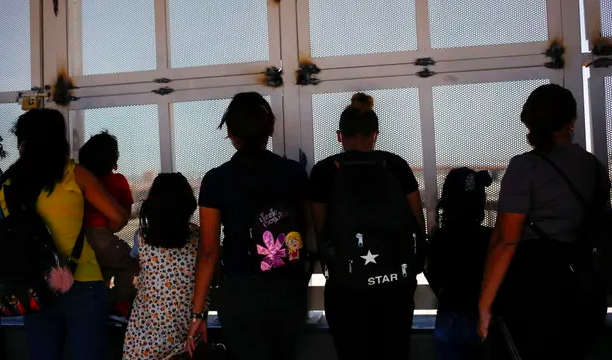
The Guardian
In 2004, a features editor asserted that "it is no secret we are a centre-left newspaper."
The US government on Wednesday ended two Trump administration policies that made it harder for immigrants fleeing violence to qualify for asylum, especially Central Americans.
Attorney general Merrick Garland issued a new policy saying immigration judges should cease following the Trump-era rules that made it tough for immigrants who faced domestic or gang violence to win asylum in the United States. The move could make it easier for them to win their cases for humanitarian protection and was widely celebrated by immigrant advocates.
“The significance of this cannot be overstated,” said Kate Melloy Goettel, legal director of litigation at the American Immigration Council. “This was one of the worst anti-asylum decisions under the Trump era, and this is a really important first step in undoing that.”
US immigration: humanitarian groups tasked with picking asylum seekers
Read more
Garland said he was making the changes after President Joe Biden ordered his office and the Department of Homeland Security to draft rules addressing complex issues in immigration law about groups of people who should qualify for asylum.
The changes come as US immigration authorities have reported unusually high numbers of encounters with migrants at the southern border. In April, border officials reported the highest number of encounters in more than 20 years, though many migrants were repeat crossers who previously had been expelled from the country under pandemic-related powers. The number of children crossing the border alone also has been hovering at all-time highs.
Many Central Americans arrive on the border fleeing gang violence in their countries. But it isn’t easy to qualify for asylum under US immigration laws, and the Trump-era policies made it that much harder.
More than half of asylum cases decided by the immigration courts in the 2020 fiscal year were denials, according to data from the department of justice’s executive office for immigration review. Four years earlier, it was about one in five cases.
In the current fiscal year, people from countries such as Russia and Cameroon have seen higher asylum grant rates in the immigration courts than people from El Salvador, Guatemala and Honduras, the data shows.
One of the Trump administration policies was aimed at migrants who were fleeing violence from non-state actors, such as gangs, while the other affected those who felt they were being targeted in their countries because of their family ties, said Jason Dzubow, an immigration attorney in Washington who focuses on asylum.
Dzubow said he recently represented a Salvadoran family in which the husband was killed and gang members started coming after his children. While Dzubow argued they were in danger because of their family ties, he said the immigration judge denied the case, citing the Trump-era decision among the reasons.
Dzubow welcomed the change but said he doesn’t expect to suddenly see large numbers of Central Americans winning their asylum cases, which remain difficult under US law.
“I don’t expect it is going to open the floodgates, and all of a sudden everyone from Central America can win their cases. Those cases are very burdensome and difficult,” he said. “We need to make a decision: do we want to protect these people?”
… we have a small favour to ask. You’ve read
56 articles
in the last year, making you one of our top readers globally. Tens of millions have placed their trust in the Guardian’s high-impact journalism since we started publishing 200 years ago, turning to us in moments of crisis, uncertainty, solidarity and hope. More than 1.5 million readers, in 180 countries, have recently taken the step to support us financially – keeping us open to all, and fiercely independent.
With no shareholders or billionaire owner, we can set our own agenda and provide trustworthy journalism that’s free from commercial and political influence, offering a counterweight to the spread of misinformation. When it’s never mattered more, we can investigate and challenge without fear or favour.
Unlike many others, Guardian journalism is available for everyone to read, regardless of what they can afford to pay. We do this because we believe in information equality. Greater numbers of people can keep track of global events, understand their impact on people and communities, and become inspired to take meaningful action.
We aim to offer readers a comprehensive, international perspective on critical events shaping our world – from the Black Lives Matter movement, to the new American administration, Brexit, and the world's slow emergence from a global pandemic. We are committed to upholding our reputation for urgent, powerful reporting on the climate emergency, and made the decision to reject advertising from fossil fuel companies, divest from the oil and gas industries, and set a course to achieve net zero emissions by 2030.
If there were ever a time to join us, it is now. Every contribution, however big or small, powers our journalism and sustains our future. Support the Guardian from as little as $1 – it only takes a minute. Thank you.
Support the Guardian
Remind me in July
Topics
US immigration
Biden administration
US politics
US-Mexico border
Joe Biden
Trump administration
news
Reuse this content
Advertisement










